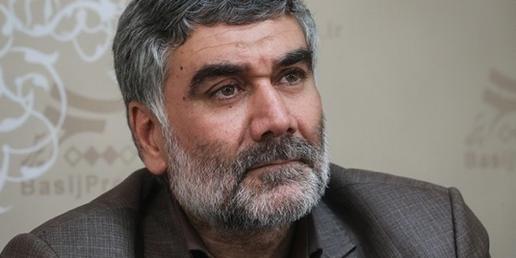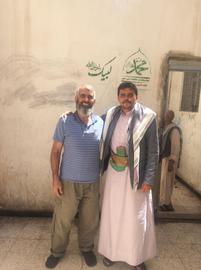An Iranian citizen journalist, who writes under a pseudonym to protect his identity, wrote the following article on the ground inside Iran.
Rasoul Khadem, the head of Iran’s Wrestling Federation, has been forced to resign over the continued ban on Iranian athletes competing with Israelis. On March 3, he issued a statement urging Iranian politicians not to sacrifice the country’s national champions to further their own political agenda and saying he had resigned on February 28 because of what he described as “the politicization of Iranian sports.” He also accused Iranian officials of “lying,” being indifferent to “Iran’s national champions” and their standing in the world, and said that state officials seemed to regard the performance of Iranian athletes as no more than a kind of entertainment for the people.
Iran’s ultra-conservatives and the Revolutionary Guards have responded with anger to Khadem’s decision. And one Revolutionary Guards’ official known for his hardline stance on the conduct of athletes issued a warning: Anybody who even dared to challenge one of Iran’s biggest red lines would face harsh repercussions, and potentially violence. “We will break their legs when they make the very first move,” the commander said.
A History of Red Lines
The red line banning Iranian athletes from competing against Israelis was established in 1983. That year, the FILA World Wrestling Championships were held in Kiev, which was part of the Soviet Union in those days. The Iranian Greco-Roman wrestler Bijan Seifkhani went to the mat against Robinson Konashvili from Israel in the 74-kilo category. He won 7-4.
But immediately after the news of Seifkhani’s victory, the then-Foreign Minister Ali Akbar Velayati ordered the Iranian team to return to Iran immediately. And when they arrived back, all members of team, athletes and non-athletes alike— and Seifzadeh in particular — were severely reprimanded.
Then the Iranian government made a categorical announcement: No Iranian athlete was to compete against “Zionists” under any condition, whether in official competitions or unofficially. The justification was that Iran did not recognize Israel as a state, and that it was defending the Palestinian people.
It was at this point that the Islamic Republic began its destruction of Iranian international sport. Now, after 35 years, the situation continues to be dire, claiming victims from Iran’s athletic community on a regular basis.
“A Medal that Smells of Blood”
In one example, during the 2016 World Cup shooting competitions in Baku, Azerbaijan, in which the teams of 80 countries participated, Iranian athlete Hossein Bagheri won a silver in the Men’s 10m Air Rifle, Iran’s first medal in the competitions. But when a photograph of him standing next to the Israeli bronze medalist Sergey Richter was published, the Young Journalists Club, part of Islamic Republic of Iran Broadcasting (IRIB), referred to it as “a medal that smells of blood.” On his return to Iran, not only did Bagheri receive no congratulations or thanks, he was summoned for questioning about why he had appeared next to an Israeli.
Perhaps the best-remembered example prior to 2017 occured at the 2004 Athens Olympics. The judo athlete Arash Mir-Esmaili was considered to be the greatest chance for Iran to win a medal, and at the opening ceremonies it was he who carried the Iranian flag. In the first lottery, Mir-Esmaili was matched against Ehud Vaks from Israel. He knew he could not compete against an Israeli athlete and disqualified himself by claiming he was overweight. But the Iranian media had no qualms about telling the truth. A spokeswoman for the Iranian National Olympic Committee in Tehran said Iran's flag-bearer had been instructed not to compete, according to the Guardian. "This is a general policy of our country to refrain from competing against athletes of the Zionist regime, and Arash Mir-Esmaili has observed this policy," she said.
On Mir-Esmaili's return to Iran, the then-Speaker of parliament Gholamali Haddad and a group of MPs welcomed him at the airport. Ayatollah Khamenei also came forth with his opinion. “They made a lot of noise [about Mir-Esmaili’s refusal] so that it would be condemned, but this devout young Iranian outsmarted them with a fait accompli,” he told a group of Iranian athletes.
Mohammad Khatami, who was president at the time, awarded Mir-Esmaili a cash prize the equivalent of $125,000, and Tehran’s mayor Mohammad Bagher Ghalibaf named a building complex in Tehran after the athlete to thank him for “supporting the Palestinian people.”
Not a Matter of Personal Choice
But Iranian athletes have no choice about whether they compete against Israeli athletes or not. If they do cross this red line, they will meet the same fate as that of a genius teenager, the chess player Borna Derakhshani. In 2017, after he competed against an Israeli chess player at the Gibraltar Chess Festival, he came under attack by hardliners and some members of the parliament. As a result, he decided to abandon Iran’s Chess Federation and instead play chess for England.
In August 2017, when the Iranian footballers Masoud Shojaei and Ehsan Hajsafi defied the ban and played for Greek team Panionios against the Israeli team Maccabi in a qualifying match for the Europa League, they were attacked by the Ministry of Sports, the media associated with the Revolutionary Guards and General Davoud Azarnoush, commander of the Basiji Athletes Organization, which is under the umbrella of the Basij paramilitary — and the Basij is in turn part of the Revolutionary Guards. “What these two footballers did was shocking,” said the general at the time. A week later, he announced that Shojaei and Hajsafi would be forgiven only if they apologized to the people and “the martyrs.” Hajsafi wrote an apology but Shojaei has yet to be invited to play for Iran’s National Football Team because he has not followed the example of his teammate.
The Basiji Athletes Organization’s charter states that it observes guidelines set by Ayatollah Khomeini and the Supreme Leader — that is to elevate the standing of the Basijis in sports, to prepare the ground for Hezbollahi and Basiji forces to assume positions of leadership in Iranian sports, and to promote revolutionary beliefs.
“We Can Do Away with Football”
General Azarnoush is known for his colorful remarks about Iranian sports. “If Iranian football deviates from values of Islam and our system, then we will do away with football,” he told a gathering of the Basijis in Isfahan in the summer of 2015.
On October 11, 2016, Iranian and Korean national teams competed against each other at Tehran’s Azadi Stadium in the qualifying games for the 2018 FIFA World Cup in Russia. The match took place on Ashura, one of the holiest days in Shia Islam, and so the stadium was covered in black, with black flags fluttering everywhere to mourn the martyrdom of Imam Hossein, the grandson of the Prophet Mohammad. One day before the match, General Azarnoush said that if the game was to take place, it must not be shown on television. “People can watch it [on TV] after Ashura,” he said. He seemed to suggest that it did not matter whether the match was televised or not — in direct contrast to the opinion of the country’s many football fans.
Also in 2017, Iranian Wrestling Federation president Rasoul Khadem asked that more attention be paid to women’s wrestling. General Azarnoush responded with: “What for? Have we solved all the problems of Iranian sports and now all that remains is to send a few women to the wrestling mat?”
Two months later, when Borna Derakhshani played against an Israeli chess player, he said: “We are not going to forget this. I talked to the minister of sports and his deputy for cultural affairs and they promised to take serious action.”
Now Rasoul Khadem has openly criticized the ban on competing against Israeli athletes and resigned from running Iran’s Wrestling Federation, and General Azarnoush had his response ready. Competing against Israeli athletes in any sport is a red line that cannot be crossed, he said.
“Lose! You Must Lose!”
The latest dispute over wrestling goes back to November 2017 and the Wrestling Under-23s World Championship, which was hosted by Poland. Iranian freestyle wrestler Alireza Karimi was just about to beat his Russian opponent Alikhan Zhabrailov when his coach approached his mat and shouted out: “Lose, Alireza! You must lose. Do not win, Alireza!”
The coach had been informed that if Karimi won, his next match would be against the Israeli wrestler Uri Kalashnikov.
After this episode, the United World Wrestling opened a case regarding “political intervention in Iranian sports” at the request of the International Olympics Committee (IOC). In 2006, the IOC updated the Olympic charter, making it clear that if an athlete refused to compete against other athletes on political, religious, racial or ethnic grounds, that athlete would be banned from international competitions. Furthermore, the federation or the Olympics committee of that country would be fined and/or be banned from competitions.
Rasoul Khadem, who was at the time the head of Iran’s Wrestling Federation and sat on United World Wrestling’s board of directors, succeeded in temporarily holding off a suspension for Iranian wrestling. However, he was clear when setting out what he knew would happen: “If Iranian wrestlers are banned from competing against Israelis, Iranian wrestling and even all sports will be suspended.”
It was the comments from General Gholamhossein Gheybparvar, the commander of Basiji forces, that showed the violence behind the vitriol. He referred to Khadem’s resignation as a gesture toward “testing the water of relations with Israel,” and added: “This is not something we can test, and if the test result is positive, then we take further steps. No further steps will be taken — because will break their legs when they make the very first move.”
Of course, the outspoken General Azarnoush was not far behind his boss. “We do not recognize this phony Israel,” he announced. “Therefore, any competition with the athletes of this phony regime is out of the question. We have made this clear in a variety of arenas.”
As Khadem has warned, if Iranian athletes continue to refuse to compete against Israelis, Iranian sports are in the “real danger.” Whole sports and their athletes risk being suspended from international competitions. And there can be little doubt that the International Olympics Committee and every international sports federation will view these recent statements from the two generals as clear examples of intervention of politics in Iranian sports, and as grounds for suspension. The Islamic Republic might have its own red lines — but this is an international red line over which it has no control.
Pedram Ghaemi, Citizen journalist
Read more about Iran’s ban on competing against Israeli athletes:
Wrestler Forced to Lose to Avoid Competing Israeli, November 2017
Chess Grandmaster's Brother Also Abandons Iran, October 2017
Iranian Footballers Make History by Defying Israel Ban, August 2017
Will Iran be Banned from the World Cup?, August 2017
The Fear of Competing Against Israel, February 2017
visit the accountability section
In this section of Iran Wire, you can contact the officials and launch your campaign for various problems


























comments